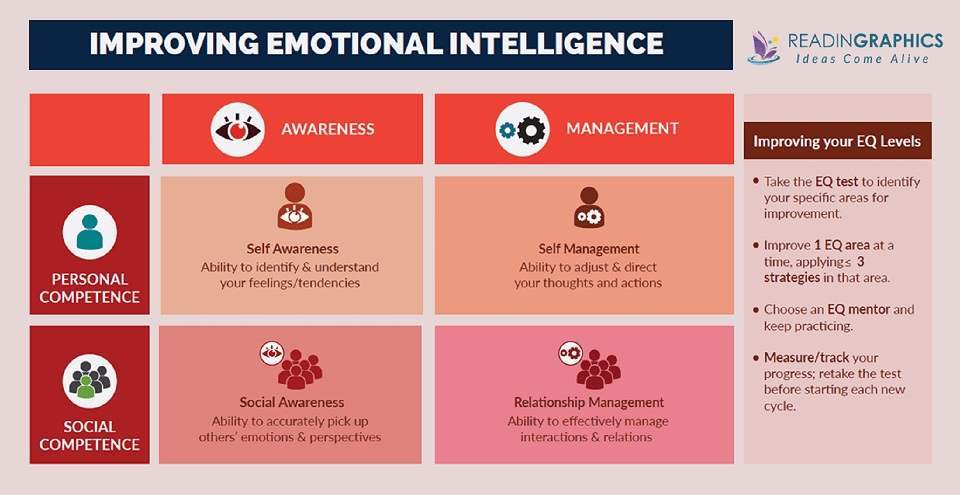Emotions
play an essential role in human development and society. Relationships and
bonds formed between people or groups depend highly on experiencing,
processing, and understanding the emotions involved.
اضافة اعلان
The
ability to understand your own emotions and the emotions of others is what is
known as emotional intelligence, or emotional quotient (EQ). Some argue that
emotional intelligence is more important than intelligence quotient (IQ) when
it comes to success.
What is Emotional Intelligence?
The
concept of emotional intelligence is relatively new and complex; it’s comprised
of four different components, which include perception of emotions, using
emotions to facilitate reason, understanding emotions, and the ability to
regulate emotions.
Perceiving
emotions, also known as social awareness, goes beyond the vocalization of
emotion. It is dependant on noticing subtleties in body language and behavior,
and it depends mainly on non-verbal cues.
Being
able to pick up on non-verbal cues and noticing slight changes in behavior is
not foreign to people. In fact, the inability to do so is considered to be a
disorder called social-emotional agnosia.
This
component is fundamental for individual and social communication and growth.
Emotions may be difficult to explain in spoken words, but body language
transcends words and can be universally understood. An example of non-verbal
cues perception of emotions is two strangers that speak two different languages
meet; they both will not understand what the other is saying but can understand
what the other is feeling.
The
second component of
emotional intelligence is using emotions to facilitate
reason or self-awareness. This component uses emotions to promote thinking and
cognitive activity., which helps individuals understand and analyze emotional
responses to navigate situations better.
Our
minds naturally respond to things emotionally. For instance, having a
particular thought that scares you, such as losing a loved one, should be
explored. Instead of shutting down the idea, thinking and rationalizing why
that thought caused an adverse reaction can help develop a greater sense of
understanding and appreciation for yourself and those around you.
Similarly,
emotional responses may also indicate what an individual considers important.
For example, the thought of starting a family may excite certain people and,
therefore, could be their subconscious desire. By becoming aware and
understanding these thoughts, individuals can prioritize their wants, values,
tasks, and more, which can assist them in being successful.
The
third component is the ability to understand emotions or relationship
management. This component goes beyond simply perceiving emotions. To
understand emotions, the individual has to place themselves in someone else’s
position and attempt to feel and understand what they are feeling.
Understanding
emotions from another perspective help alter the way people approach
situations. For example, if you cut someone off on the highway and hop out of
their car to confront you, they may be angry and confrontational. Upon initial
assessment of the situation, you may find their reaction to be a gross
overreaction, and in turn, you become angry at the individual for behaving
inappropriately.
However,
if you take a quick moment to understand the other person’s perspective, you
may react differently. Perhaps this time you notice a baby in the car, you
consider that his anger did not come from you cutting them off, but the threat
of their child being in danger.
Suddenly,
their anger seems more justified and would likely cause you to approach the
situation more tenderly even if you do not have a child. This justification or
understanding of the underlying cause of emotions is called empathy and is a
fundamental tool for understanding emotions and not just perceiving them.
The
final component of emotional intelligence is regulating our own emotions or
self-management. Managing our emotions tends to be the most challenging aspect
of emotional intelligence. Feeling and expressing emotions such as happiness,
sadness, or anger are healthy and normal in human behavior.
In
contrast, when we express these emotions that are unregulated and uncontrolled,
it can become unhealthy. Fortunately, through strengthening the other aspects
of emotional intelligence, you can better manage your own emotions as well.
How to Improve Emotional
Intelligence:
There
are many simple ways to improve emotional intelligence. The most significant
factor to improvement is based on interpersonal reflection and an individual’s
motivation to improve. The first step is analyzing how your emotions affect
your behavior.
 Chart that discusses how
to improve emotional intelligence. (Photo: Flickr)
Chart that discusses how
to improve emotional intelligence. (Photo: Flickr)
Take
time at the end of the day to consider the events that took place and
investigate areas that you would like to improve on. Furthermore, tuning in to
verbal and non-verbal cues is essential for social and self-improvement.
The
final step is to practice empathy. No matter how mundane the situation, put in
the conscious effort to understand the perspective of others and try to keep
that perspective in mind when reacting to the situation.
Another
option available locally is at AMIDEAST, an American nonprofit organization
located in Abdoun. AMIDEAST offers courses in “soft skills,” which include
emotional intelligence. Their goal is to improve communication, leadership,
problem-solving, and teamwork for their patrons through courses, workshops, and
seminars.
Additionally,
there are many online self-help guides and tutorials that may have a more
individualized approach.
Read more Health



